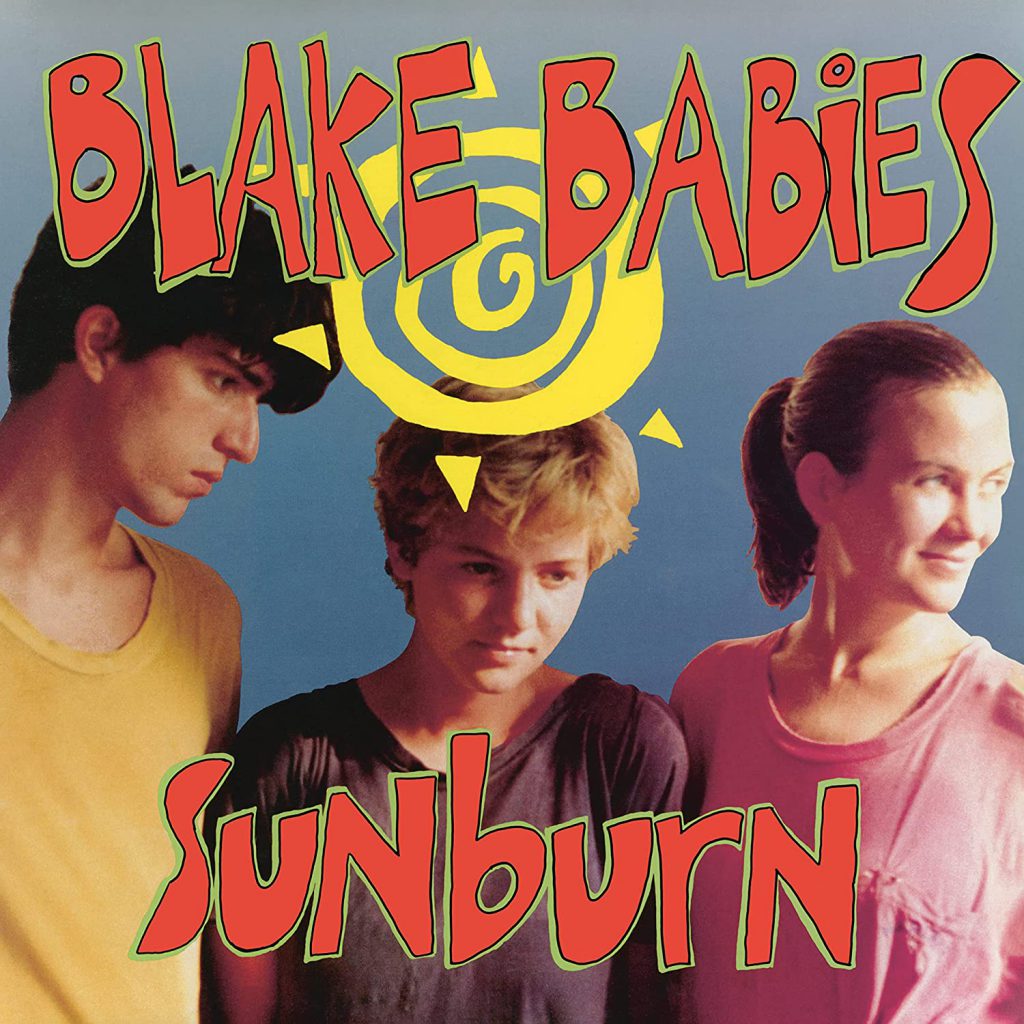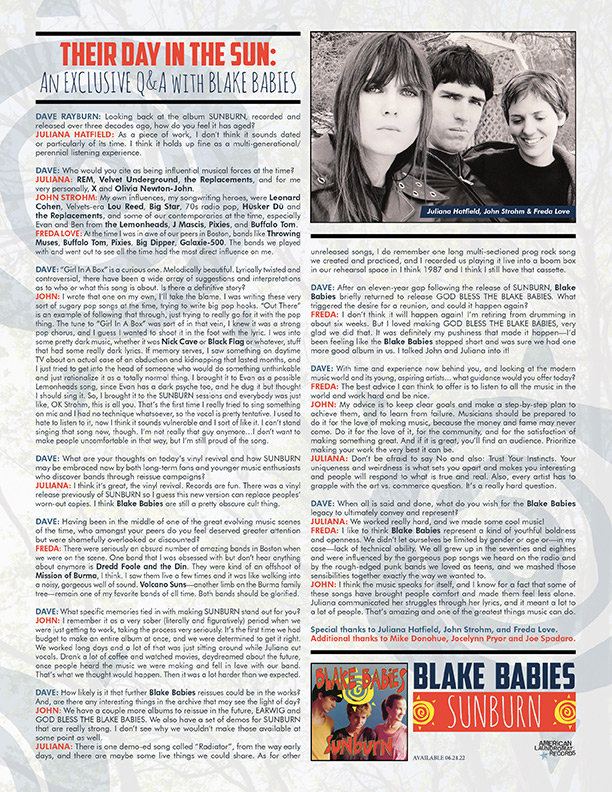DAVE RAYBURN: Looking back at the album SUNBURN, recorded and released over three decades ago, how do you feel it has aged?
JULIANA HATFIELD: As a piece of work, I don’t think it sounds dated or particularly of its time. I think it holds up fine as a multi-generational/perennial listening experience.
DAVE: Who would you cite as being influential musical forces at the time?
JULIANA: REM, Velvet Underground, the Replacements, and for me very personally, X and Olivia Newton-John.
JOHN STROHM: My own influences, my songwriting heroes, were Leonard Cohen, Velvets-era Lou Reed, Big Star, 70s radio pop, Hüsker Dü and the Replacements, and some of our contemporaries at the time, especially Evan and Ben from the Lemonheads, J Mascis, Pixies, and Buffalo Tom.
FREDA LOVE: At the time I was in awe of our peers in Boston, bands like Throwing Muses, Buffalo Tom, Pixies, Big Dipper, Galaxie-500. The bands we played with and went out to see all the time had the most direct influence on me.
DAVE: “Girl In A Box” is a curious one. Melodically beautiful. Lyrically twisted and controversial, there have been a wide array of suggestions and interpretations as to who or what this song is about. Is there a definitive story?
JOHN: I wrote that one on my own, I’ll take the blame. I was writing these very sort of sugary pop songs at the time, trying to write big pop hooks. “Out There” is an example of following that through, just trying to really go for it with the pop thing. The tune to “Girl In A Box” was sort of in that vein, I knew it was a strong pop chorus, and I guess I wanted to shoot it in the foot with the lyric. I was into some pretty dark music, whether it was Nick Cave or Black Flag or whatever, stuff that had some really dark lyrics. If memory serves, I saw something on daytime TV about an actual case of an abduction and kidnapping that lasted months, and I just tried to get into the head of someone who would do something unthinkable and just rationalize it as a totally normal thing. I brought it to Evan as a possible Lemonheads song, since Evan has a dark psyche too, and he dug it but thought I should sing it. So, I brought it to the SUNBURN sessions and everybody was just like, OK Strohm, this is all you. That’s the first time I really tried to sing something on mic and I had no technique whatsoever, so the vocal is pretty tentative. I used to hate to listen to it, now I think it sounds vulnerable and I sort of like it. I can’t stand singing that song now, though. I’m not really that guy anymore…I don’t want to make people uncomfortable in that way, but I’m still proud of the song.
DAVE: What are your thoughts on today’s vinyl revival and how SUNBURN may be embraced now by both long-term fans and younger music enthusiasts who discover bands through reissue campaigns?
JULIANA: I think it’s great, the vinyl revival. Records are fun. There was a vinyl release previously of SUNBURN so I guess this new version can replace peoples’ worn-out copies. I think Blake Babies are still a pretty obscure cult thing.
DAVE: Having been in the middle of one of the great evolving music scenes of the time, who amongst your peers do you feel deserved greater attention but were shamefully overlooked or discounted?
FREDA: There were seriously an absurd number of amazing bands in Boston when we were on the scene. One band that I was obsessed with but don’t hear anything about anymore is Dredd Foole and the Din. They were kind of an offshoot of Mission of Burma, I think. I saw them live a few times and it was like walking into a noisy, gorgeous wall of sound. Volcano Suns—another limb on the Burma family tree—remain one of my favorite bands of all time. Both bands should be glorified.
DAVE: What specific memories tied in with making SUNBURN stand out for you?
JOHN: I remember it as a very sober (literally and figuratively) period when we were just getting to work, taking the process very seriously. It’s the first time we had budget to make an entire album at once, and we were determined to get it right. We worked long days and a lot of that was just sitting around while Juliana cut vocals. Drank a lot of coffee and watched movies, daydreamed about the future, once people heard the music we were making and fell in love with our band. That’s what we thought would happen. Then it was a lot harder than we expected.
DAVE: How likely is it that further Blake Babies reissues could be in the works? And, are there any interesting things in the archive that may see the light of day?
JOHN: We have a couple more albums to reissue in the future, EARWIG and GOD BLESS THE BLAKE BABIES. We also have a set of demos for SUNBURN that are really strong. I don’t see why we wouldn’t make those available at some point as well.
JULIANA: There is one demo-ed song called “Radiator”, from the way early days, and there are maybe some live things we could share. As for other unreleased songs, I do remember one long multi-sectioned prog rock song we created and practiced, and I recorded us playing it live into a boom box in our rehearsal space in I think 1987 and I think I still have that cassette.
DAVE: After an eleven-year gap following the release of SUNBURN, Blake Babies briefly returned to release GOD BLESS THE BLAKE BABIES. What triggered the desire for a reunion, and could it happen again?
FREDA: I don’t think it will happen again! I’m retiring from drumming in about six weeks. But I loved making GOD BLESS THE BLAKE BABIES, very glad we did that. It was definitely my pushiness that made it happen—I’d been feeling like the Blake Babies stopped short and was sure we had one more good album in us. I talked John and Juliana into it!
DAVE: With time and experience now behind you, and looking at the modern music world and its young, aspiring artists… what guidance would you offer today?
FREDA: The best advice I can think to offer is to listen to all the music in the world and work hard and be nice.
JOHN: My advice is to keep clear goals and make a step-by-step plan to achieve them, and to learn from failure. Musicians should be prepared to do it for the love of making music, because the money and fame may never come. Do it for the love of it, for the community, and for the satisfaction of making something great. And if it is great, you’ll find an audience. Prioritize making your work the very best it can be.
JULIANA: Don’t be afraid to say No and also: Trust Your Instincts. Your uniqueness and weirdness is what sets you apart and makes you interesting and people will respond to what is true and real. Also, every artist has to grapple with the art vs. commerce question. It’s a really hard question.
DAVE: When all is said and done, what do you wish for the Blake Babies legacy to ultimately convey and represent?
JULIANA: We worked really hard, and we made some cool music!
FREDA: I like to think Blake Babies represent a kind of youthful boldness and openness. We didn’t let ourselves be limited by gender or age or—in my case—lack of technical ability. We all grew up in the seventies and eighties and were influenced by the gorgeous pop songs we heard on the radio and by the rough-edged punk bands we loved as teens, and we mashed those sensibilities together exactly the way we wanted to.
JOHN: I think the music speaks for itself, and I know for a fact that some of these songs have brought people comfort and made them feel less alone. Juliana communicated her struggles through her lyrics, and it meant a lot to a lot of people. That’s amazing and one of the greatest things music can do.
Special thanks to Juliana Hatfield, John Strohm, and Freda Love.
Additional thanks to Mike Donohue, Jocelynn Pryor, Stephen Schnee and Joe Spadaro.

BLAKE BABIES
SUNBURN (vinyl reissue)
6.24.22
